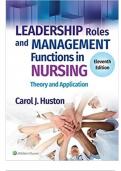Medconnoiseur
,Leadership Roles and Management Functions in Nursing 11th Edition Marquis
Huston Test Bank
Chapter 1: Decision Making, Problem Solving, Critical Thinking, and Clinical Reasoning: Requisites
for successful leadership and management
1. What statement is true regarding decision making?
A) It is an analysis of a situation
B) It is closely related to evaluation
C) It involves choosing between courses of action
D) It is dependent upon finding the cause of a
problem
Ans: C
Feedback:
Decision making is a complex cognitive process often defined as choosing
a particular course of action. Problem solving is part of decision making
and is a systematic process that focuses on analyzing a difficult situation.
Critical thinking, sometimes referred to asreflective thinking, is related to
evaluation and has a broader scope than decision making and problem
solving.
2. What is a weakness of the traditional problem-solving model?
A) Its need for implementation time
B) Its lack of a step requiring evaluation of results
C) Its failure to gather sufficient data
D) Its failure to evaluate
alternatives
Ans: A
Feedback:
The traditional problem-solving model is less effective when time
constraints are a consideration. Decision making can occur without the
full analysis required in problem solving. Because problem solNving
attempts to identify the root problem in situations, much time and energy
are spent on identifying the real problem.
3. Which of the following statements is true regarding decision making?
A) Scientific methods provide identical decisions by different
individuals for the same problems
B) Decisions are greatly influenced by each person's value system
C) Personal beliefs can be adjusted for when the scientific approach
to problem solving is used
D) Past experience has little to do with the quality of the
decision
Medconnoiseur
, Ans: B
Feedback:
Values, life experience, individual preference, and individual ways of
thinking will influence a person's decision making. No matter how
objective the criteria will be, value judgments will always play a part in a
Person’s decision making, either consciously or subconsciously.
4. What influences the quality of a decision most often?
A) The decision maker's immediate superior
B) The type of decision that needs to be made
C) Questions asked and alternatives generated
D) The time of day the decision is
made
Ans: C
Feedback:
The greater the number of alternatives that can be generated by the
decision maker, the better the final decision will be. The alternatives
generated and the final choices are limited by each person's value system.
5. What does knowledge about good decision making lead one to believe?
A) Good decision makers are usually right-brain, intuitive thinkers
B) Effective decision makers are sensitive to the situation and to others
C) Good decisions are usually made by left-brain, logical thinkers
D) Good decision making requires analytical rather than creative
processes
Ans: B
Feedback:
Good decision makers seem to have antennae that make them particularly
sensitive to other people and situations. Left-brain thinkers are typically
better at processing language, logic, numbers, and sequential ordering,
whereas right-brain thinkers excel at nonverbal ideation and holistic
synthesizing.
6. What is the best definition of decision making?
A) The planning process of management
B) The evaluation phase of the executive role
C) One step in the problem-solving process
D) Required to justify the need for
scarce items
Ans: C
Feedback:
Medconnoiseur
, Decision making is a complex, cognitive process often defined as
choosing a particular course of action. Decision making, one step in the
problem-solving process, is an important task that relies heavily on critical
thinking and clinical reasoning skills.
7. If decision making is triggered by a problem with what does it end?
A) An alternative problem
B) A chosen course of action
C) An action that guarantees success
D) A restatement of the
solution
Ans: B
Feedback:
A decision is made when a course of action has been chosen. Problem
solving is part of decision making and is a systematic process that
focuseson analyzing a difficult situation. Problem solving always
includes a decision-making step.
8. Why do our values often cause personal conflict in decision making?
A) Some values are not realistic or healthy
B) Not all values are of equal worth
C) Our values remain unchanged over time
D) Our values often collide with one
another
Ans: D
Feedback:
Values, life experience, individual preference, and individual ways of
thinking will influence a person's decision making. No matter how
objective the criteria will be, value judgments will always play a part in
aperson's decision making, either consciously or subconsciously.
9. Which statement is true concerning critical thinking?
A) It is a simple approach to decision making
B) It is narrower in scope than decision making
C) It requires reasoning and creative analysis
D) It is a synonym for the problem-solving
process
Ans: C
Feedback:
Critical thinking has a broader scope than decision making and problem
solving. It is sometimes referred to as reflective thinking. Critical
thinking also involves reflecting upon the meaning of statements,
Medconnoiseur




